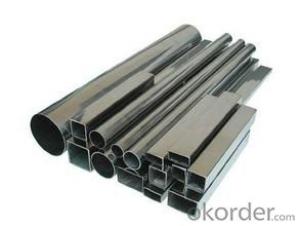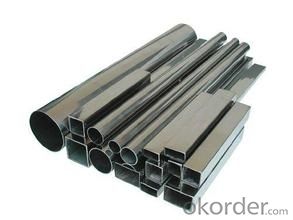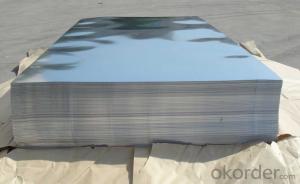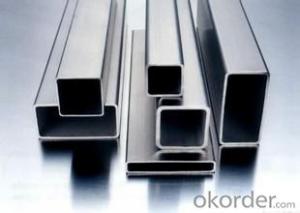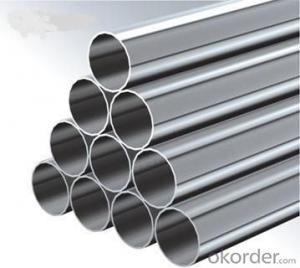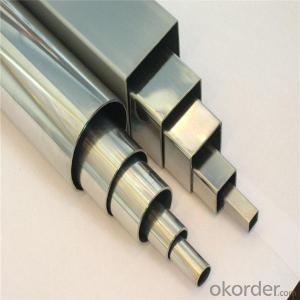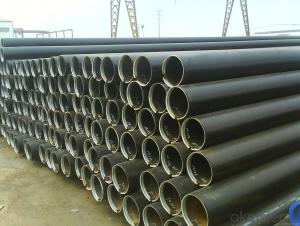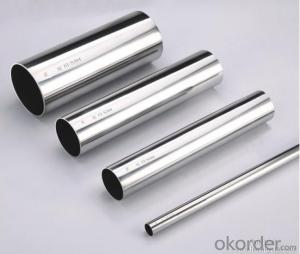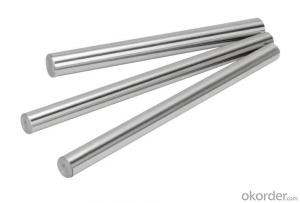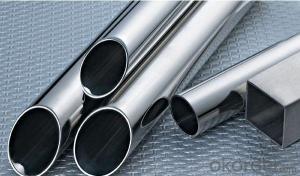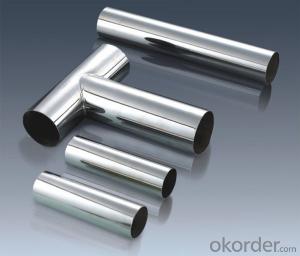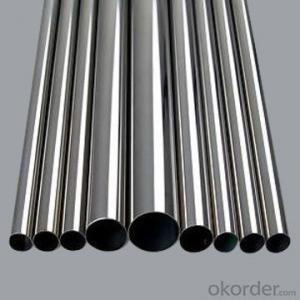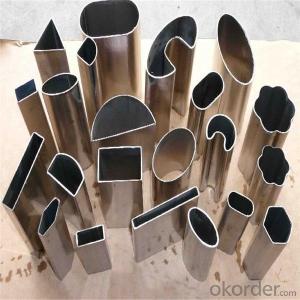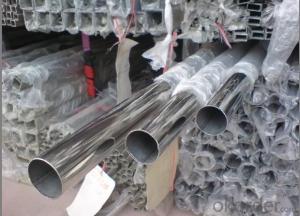stainless steel tube 304 1.4301 from okorder.com
- Loading Port:
- Tianjin
- Payment Terms:
- TT OR LC
- Min Order Qty:
- 25 m.t.
- Supply Capability:
- 1000 m.t./month
OKorder Service Pledge
Quality Product, Order Online Tracking, Timely Delivery
OKorder Financial Service
Credit Rating, Credit Services, Credit Purchasing
You Might Also Like
Quick Details
| Standard: | ASTM,DIN,EN,GB,JIS | Place of Origin: | China (Mainland) | Brand Name: | OKORDER |
| Model Number: | AD0422 6 | Type: | Welded | Steel Grade: | 300 |
| Application: | handrail,staircase,railing,weldmesh screen,door,balcony | Certification: | SGS BV ISO | Welding Line Type: | EFW |
| Thickness: | 0.3mm to 3.0mm | Outer Diameter: | 9.53mm to 254mm | Production Standard:: | ASTM A554/A312/A249/A269/A270 |
| Polish:: | Bright or Mirror,Satin, Hairline, | bending degree:: | 180 degree/ 90 Degree | contact: | OKORDER |
| product: | large diameter stainless steel pipe | Supplier: | Taizhou Hengda | packing:: | sea worthy |
Packaging & Delivery
| Packaging Detail: | Each tube in a plastic bag, then several tubes to a seaworthy woven bag with 50kg/bundle or 400kg-500kg/bundle. Or as customer's requirement. |
| Delivery Detail: | 15 days normally |
Specifications
stainless steel pipe 316L / 347 /410/ 420/430 :
1.Grade:201,202,301,304,316L,etc
2.OD:9.53-254mm,TK:0.3-3.0mm
- Q: Can stainless steel pipes be used for pharmaceutical processing equipment?
- Yes, stainless steel pipes can be used for pharmaceutical processing equipment. Stainless steel is a preferred material in the pharmaceutical industry due to its excellent corrosion resistance, durability, and ease of cleaning. It is resistant to chemicals, corrosion, and high temperatures, making it suitable for handling and transporting various pharmaceutical substances. Additionally, stainless steel pipes have a smooth surface that minimizes the risk of contamination and allows for easy cleaning and sterilization. Overall, stainless steel pipes are widely used in pharmaceutical processing equipment to ensure the integrity and quality of pharmaceutical products.
- Q: Can stainless steel pipes be insulated with asbestos?
- No, stainless steel pipes should not be insulated with asbestos. Asbestos is a hazardous material that has been linked to serious health risks, including lung cancer and mesothelioma. It is widely recognized that exposure to asbestos fibers can be extremely dangerous, and its use has been banned in many countries. There are several alternative insulation materials available that are safer and more effective than asbestos. These include fiberglass, mineral wool, and foam insulation. These materials provide excellent thermal insulation properties without posing the same health risks as asbestos. When insulating stainless steel pipes, it is important to consider the specific requirements of the application and choose an appropriate insulation material that meets the necessary safety standards. It is always advisable to consult with a professional insulation contractor or engineer to ensure the correct insulation material is selected.
- Q: Can stainless steel pipes be used for oil refinery applications?
- Yes, stainless steel pipes can be used for oil refinery applications. Stainless steel is widely used in the oil and gas industry due to its excellent corrosion resistance properties, high strength, and durability. Oil refineries deal with harsh and corrosive environments, including high temperatures, pressure, and exposure to various chemicals. Stainless steel pipes can withstand these conditions and offer long-lasting performance. Stainless steel pipes are resistant to corrosion caused by acidic and alkaline substances, which are commonly found in oil refinery operations. They also have good resistance to pitting and crevice corrosion, making them suitable for handling crude oil, petroleum products, and other corrosive media. Furthermore, stainless steel pipes can handle high temperatures without losing their strength and integrity. This is important in oil refineries where processes involve heating and cooling operations. In addition to corrosion resistance and high-temperature capabilities, stainless steel pipes also provide excellent mechanical properties. They are strong, durable, and have good weldability, making them suitable for the demanding conditions of oil refinery applications. Overall, stainless steel pipes are a reliable choice for oil refinery applications due to their corrosion resistance, high-temperature capabilities, and mechanical properties. They ensure the safe and efficient transportation of oil and petroleum products, contributing to the smooth operations of oil refineries.
- Q: What are the different sizes available for stainless steel pipes?
- Various industrial and residential applications can be catered to with a wide range of sizes of stainless steel pipes. The sizes of stainless steel pipes typically depend on their nominal pipe size (NPS) or outside diameter (OD). The diameter of stainless steel pipes commonly ranges from 1/8 inch to 48 inches. For smaller applications or plumbing systems, stainless steel pipes with NPS 1/8, 1/4, 3/8, and 1/2 are commonly utilized. These sizes are suitable for household plumbing, water supply lines, and low-pressure applications. As the requirements increase, larger stainless steel pipe sizes are available. Sizes such as NPS 3/4, 1, 1 1/4, 1 1/2, and 2 inches are commonly employed in various industries and commercial applications. These sizes are appropriate for higher-pressure applications like hydraulic systems, oil and gas pipelines, and chemical processing plants. For industrial applications that demand even larger pipes, stainless steel pipes with sizes ranging from 2 1/2 inches to 48 inches in diameter are accessible. These large pipes are frequently used in heavy-duty applications such as petrochemical plants, power generation facilities, and large-scale construction projects. It's important to note that stainless steel pipes are also obtainable in different wall thicknesses, known as schedules. The schedule number determines the wall thickness, with higher numbers indicating thicker walls. The most common schedules for stainless steel pipes are Schedule 5, Schedule 10, Schedule 40, and Schedule 80. In conclusion, a wide range of sizes are available for stainless steel pipes, starting from 1/8 inch and going up to 48 inches in diameter. The appropriate size selection depends on the specific application and the required pressure and flow requirements.
- Q: Are stainless steel pipes suitable for chemical reactors?
- Indeed, chemical reactors find stainless steel pipes to be a fitting choice. Stainless steel, known for its exceptional durability and resistance to corrosion, proves itself as an optimal material for managing a wide range of chemicals and corrosive substances. It exhibits remarkable resistance to both extreme hot and cold temperatures, as well as protection against oxidation and scaling. Stainless steel pipes demonstrate their ability to endure the harsh conditions within a chemical reactor, including aggressive chemicals and high pressure. Furthermore, they boast an effortless cleaning and maintenance process, guaranteeing the integrity and longevity of the chemical reactor system. Ultimately, stainless steel pipes offer a dependable and secure solution for the transportation of chemicals in chemical reactors.
- Q: Can stainless steel pipes be used for pharmaceutical storage?
- Yes, stainless steel pipes can be used for pharmaceutical storage. Stainless steel is a highly durable and corrosion-resistant material, making it ideal for storing pharmaceutical products. It is easy to clean, maintains the integrity of the stored materials, and does not react with the pharmaceutical substances. Additionally, stainless steel pipes have smooth surfaces, which prevent the accumulation of bacteria and contaminants. This makes stainless steel pipes a suitable option for pharmaceutical storage where maintaining hygiene and purity is crucial.
- Q: Why is stainless steel magnetic?
- Many customers often think that the magnet adsorption of stainless steel, to verify its merits and authenticity, and do not smoke without magnetism, that is good, genuine; smokers are magnetic, is considered a fake fake. In fact, this is a very one-sided, not practical, and the wrong way to identify, I hope the following content for your help!
- Q: What is the difference between 17-4 and 316 stainless steel pipes?
- The main difference between 17-4 and 316 stainless steel pipes lies in their composition and properties. 17-4 stainless steel, also known as SAE type 630, is a precipitation-hardening stainless steel that contains approximately 17% chromium and 4% nickel. It also contains small amounts of copper, niobium, and tantalum. The addition of these elements enables 17-4 stainless steel to undergo a heat treatment process, known as precipitation hardening, which increases its strength and hardness. This makes it suitable for applications that require high strength and good corrosion resistance, such as in aerospace and defense industries. However, it may not have the best resistance to certain corrosive environments compared to other stainless steels. On the other hand, 316 stainless steel is an austenitic stainless steel that contains approximately 16-18% chromium, 10-14% nickel, and 2-3% molybdenum. This composition provides excellent corrosion resistance, particularly in chloride-containing environments such as marine environments or coastal areas. 316 stainless steel is also known for its good weldability and formability, making it a popular choice in various industries including food processing, pharmaceuticals, and chemical processing. In summary, the primary difference between 17-4 and 316 stainless steel pipes lies in their composition and properties. 17-4 stainless steel offers higher strength and hardness through precipitation hardening, while 316 stainless steel provides superior corrosion resistance, especially in chloride-containing environments. The choice between the two will depend on the specific requirements of the application, with considerations for strength, corrosion resistance, and other factors.
- Q: Are stainless steel pipes suitable for underground installations?
- Yes, stainless steel pipes are suitable for underground installations. Stainless steel is highly resistant to corrosion and can withstand harsh underground conditions such as moisture, soil chemicals, and temperature variations. Additionally, stainless steel pipes have high strength and durability, making them a reliable choice for underground applications.
- Q: 304L stainless steel pipe can withstand 0.1MPA?
- Stainless steel pipe is a kind of hollow long strip round steel, mainly used in petroleum, chemical, medical, food, light industry, machinery, instrument and other industrial pipeline and mechanical structure parts. In addition, the bending and torsional strength of the same weight is lighter, so it is also widely used in the manufacture of mechanical parts and engineering structures. It is also used to produce all kinds of conventional weapons, guns, shells and so on.
Send your message to us
stainless steel tube 304 1.4301 from okorder.com
- Loading Port:
- Tianjin
- Payment Terms:
- TT OR LC
- Min Order Qty:
- 25 m.t.
- Supply Capability:
- 1000 m.t./month
OKorder Service Pledge
Quality Product, Order Online Tracking, Timely Delivery
OKorder Financial Service
Credit Rating, Credit Services, Credit Purchasing
Similar products
Hot products
Hot Searches
Related keywords
